Exploring the realm of feline nutrition raises the question: is mango a safe addition to a cat's diet?
While mango itself poses no toxicity concerns, the unique taste preferences of cats and their ability to synthesize certain nutrients internally warrant a closer look at the implications of offering this tropical fruit.
Understanding how mango interacts with a cat's dietary needs and preferences can shed light on the broader conversation of introducing fruits into a feline diet.
By examining the safety and potential benefits of mango consumption for cats, we can navigate the complexities of providing a well-rounded diet for our feline friends.
Key Takeaways
- Mango is safe for cats but should be given in moderation as a treat.
- Cats may not be drawn to mango due to their preference for meat.
- Cats can produce their own vitamin C, making external sources less critical.
- Always remove the pit and peel before offering cats mango to ensure safe consumption.
Mango Is Non-Toxic for Cats
Mango poses no toxicity risks to cats, making it a safe fruit for feline consumption. While cats may not be as drawn to the taste of mango due to their limited ability to taste sweetness, they can still enjoy this tropical treat in moderation. Since cats can produce their own vitamin C, the nutritional benefits of mango may be less significant for them.
When offering mango to cats, it is essential to remove the pit and peel to prevent any potential choking hazards. Remember that fruits should only be given as occasional treats, as cats are obligate carnivores and require meat as their primary source of nutrients.
Always consult with a veterinarian before introducing new foods to your cat's diet for their overall health and well-being.
Taste Preferences and Mango Consumption
Exploring the palatability of mango to felines reveals intriguing insights into their dietary preferences and potential consumption patterns. Cats, being obligate carnivores, may not be naturally drawn to the sweetness of mango. While safe for cats, the fruit's sweetness might not align with their taste preferences. Here is a breakdown of cats' taste preferences and potential mango consumption patterns:
| Taste Preferences | Mango Consumption |
|---|---|
| Preference for meat | Limited interest in mango due to sweetness |
| Limited sweet receptors | Potential lack of attraction to mango flavor |
| Selective eaters | May not actively seek out mango as a food choice |
Understanding cats' unique taste preferences can help in gauging their interest in consuming mango as a treat.
Vitamin C Synthesis in Cats
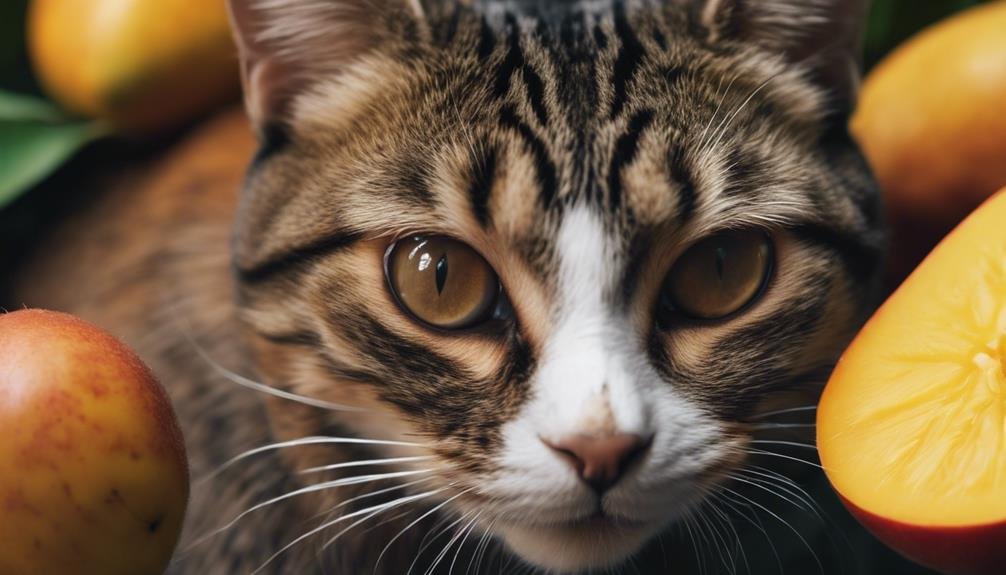
The ability of cats to synthesize their own vitamin C is a notable aspect of their physiological makeup. Unlike humans and some other animals, cats have the genetic capability to produce vitamin C internally, rendering the consumption of external sources like mango less critical for their health.
This unique trait stems from their evolutionary history as obligate carnivores, where their diet primarily consists of meat. Therefore, while mangoes contain this essential vitamin, it is less crucial for feline diets due to their natural ability to generate it endogenously.
Understanding this intrinsic ability in cats sheds light on their dietary requirements and emphasizes the significance of a meat-based diet for their overall well-being.
Moderation as a Safe Treat
Understanding the dietary requirements of cats, particularly their unique ability to synthesize vitamin C internally, underscores the importance of offering fruits like mango in moderation as a safe treat. While mango is non-toxic to cats, its sweetness may not be appealing to all felines. Since cats are obligate carnivores, their main nutrients should come from meat sources.
When considering fruits as treats, moderation is key due to the natural sugars present. Feeding mango without the pit and peel ensures safety and aids in digestion. By incorporating mango as an occasional indulgence rather than a dietary staple, cat owners can provide a diverse range of flavors while prioritizing their pet's overall health and well-being.
Preparation Without Pit and Peel
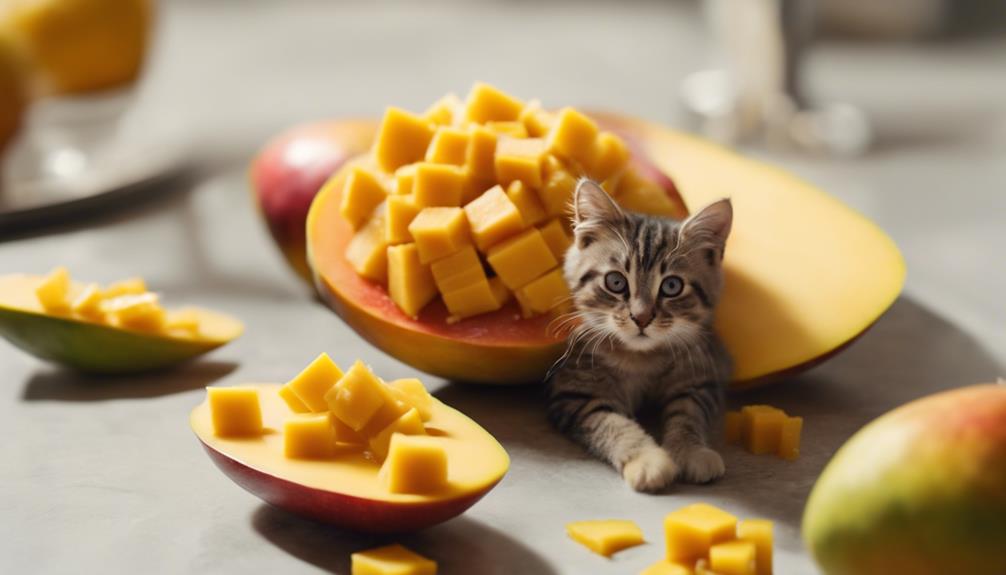
For safe consumption by cats, it is essential to prepare mango without the pit and peel. The pit of a mango contains compounds that can be harmful to cats if ingested, such as cyanide. Cats lack the necessary enzymes to break down these compounds, making it crucial to remove the pit before offering mango as a treat.
Additionally, the tough peel of the mango can be difficult for cats to digest and may pose a choking hazard. By peeling the mango and only providing the flesh in small, manageable pieces, you can ensure your feline friend enjoys this sweet fruit safely.
Always prioritize your cat's health and well-being by taking these precautions when sharing mango with them.
Removing the Pit for Safety
To ensure the safe consumption of mango by cats, it is crucial to eliminate the pit before offering the fruit as a treat. Cats can enjoy this sweet and juicy fruit when prepared correctly. Here are three important steps to follow:
- Slice: Cut the mango along the sides of the pit to extract the fruit without including the pit.
- Peel: Remove the skin of the mango to make it easier for your feline friend to digest.
- Dice: Cut the mango into small, bite-sized pieces to prevent choking hazards and make it more manageable for your cat to eat.
Peeling for Digestive Ease
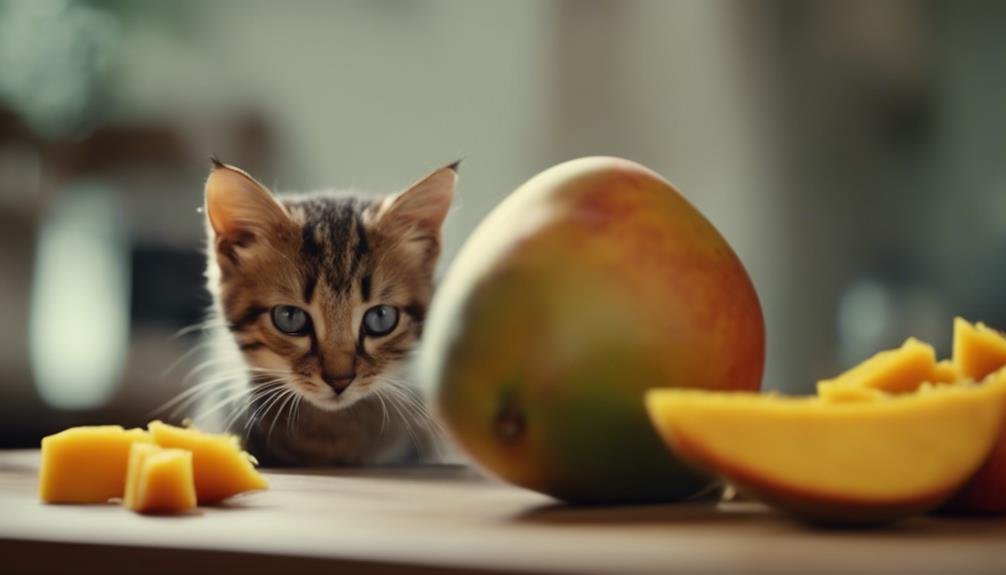
Peeling the mango before feeding it to cats can enhance digestive comfort and promote easier assimilation of the fruit's nutrients. To understand the benefits of this practice more intimately, let's explore how it can help your feline friend:
| Benefits of Peeling Mango for Cats | Emotion Evoked | Outcome |
|---|---|---|
| Easier digestion | Comfort | Happy tummy |
| Reduced risk of choking | Safety | Peace of mind |
| Increased nutrient absorption | Nourishment | Healthier cat |
Moderation Due to Natural Sugars
When considering the nutritional aspect of feeding mango to cats, it is essential to be mindful of the need for moderation due to the natural sugars present in the fruit.
Why Moderation Matters:
- Weight Management: Excessive sugar intake from fruits like mango can contribute to weight gain in cats.
- Digestive Health: Too much sugar can disrupt a cat's digestive system, leading to potential issues like diarrhea.
- Blood Sugar Levels: Monitoring sugar intake helps in maintaining stable blood sugar levels, crucial for a cat's overall health.
Fruits Shouldn't Replace Main Diet
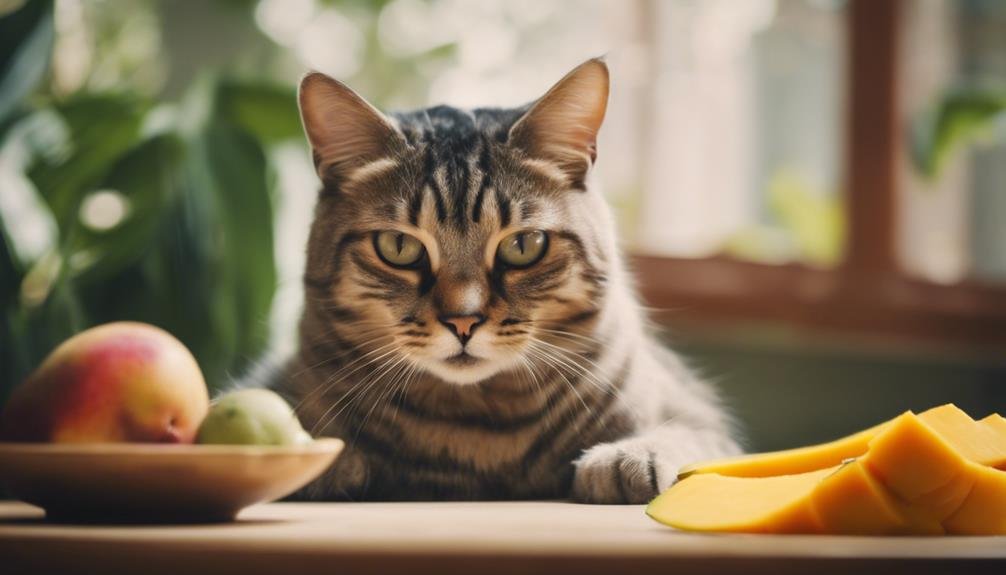
Integrating fruits into a cat's diet should complement their main meat-based nutrition rather than replace it entirely. While fruits can provide some additional nutrients and variety, they should not be the primary source of sustenance for cats. Below is a table illustrating the importance of balancing fruits with a cat's main diet:
| Benefits of Main Meat-Based Diet | Reasons Fruits Shouldn't Replace Main Diet |
|---|---|
| Provides essential nutrients like taurine | Cats are obligate carnivores and require meat for optimal health |
| Supports muscle development and maintenance | Fruits lack certain vital nutrients found in meat |
| Aids in digestion and absorption of nutrients | Excessive fruits can lead to an imbalance in a cat's diet |
| Helps maintain a healthy weight and energy levels | Meat is the primary source of protein for cats |
When incorporating fruits into a cat's diet, it's crucial to prioritize their main meat-based nutrition for overall well-being.
Main Nutrients From Meat Sources
To ensure optimal health and well-being for cats, prioritizing their main nutrients from meat sources is essential. When considering a cat's diet, the following nutrients from meat play a vital role in their overall health:
- Protein: Cats require high levels of protein to support their lean muscle mass and overall body function. Meat sources such as chicken, turkey, and beef provide essential amino acids crucial for feline health.
- Taurine: An essential amino acid for cats, taurine is primarily found in animal-based proteins. Taurine plays a critical role in maintaining proper heart function, vision, and reproductive health in cats.
- Vitamin B12: Meat sources are rich in vitamin B12, which is essential for a cat's neurological function and the formation of red blood cells.
Other Cat-Safe Fruits and Vegetables
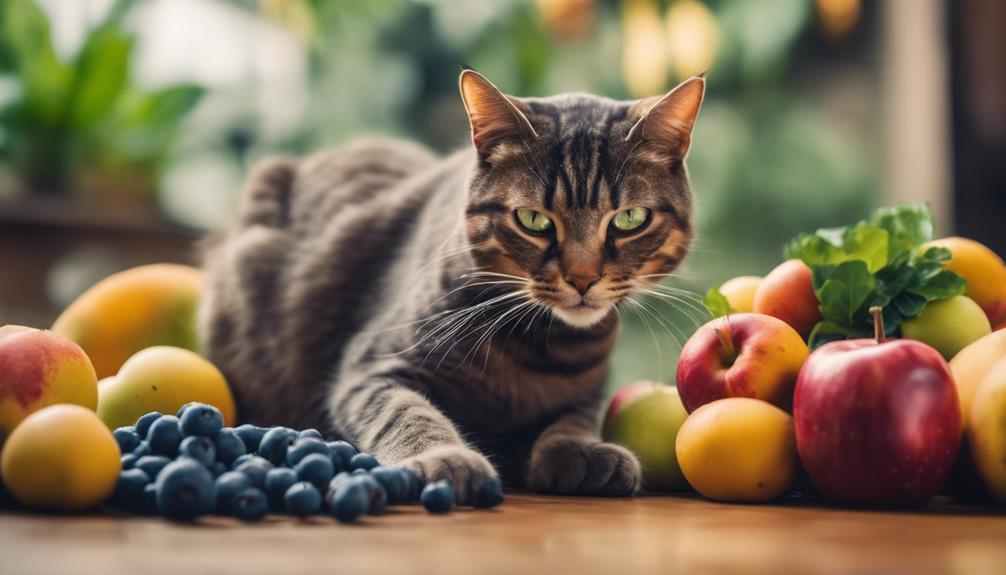
Exploring additional cat-safe fruits and vegetables beyond mango offers a variety of healthy and enjoyable options for feline dietary enrichment. Here are some other cat-friendly fruits and vegetables to consider:
| Fruits | Vegetables |
|---|---|
| Blueberries | Broccoli |
| Bananas | Cooked, unseasoned potatoes |
| Strawberries | Corn |
| Watermelon |
These options can provide your cat with added nutrients and flavors to diversify their diet. Remember, moderation is key when introducing new foods to your cat's diet. Always consult with your veterinarian before making any significant changes to ensure your cat's health and well-being.
Toxic Fruits to Avoid
Identifying fruits that are toxic to cats is crucial in ensuring their well-being and health. When it comes to your feline friend, it's important to be aware of the fruits that can be harmful to them.
Here are three fruits that you should avoid giving to your cat:
- Grapes and raisins: These fruits can cause kidney failure in cats even in small amounts.
- Citrus fruits: Citrus fruits like oranges, lemons, and limes can cause gastrointestinal issues in cats.
- Cherries: The pits of cherries contain cyanide, which is toxic to cats.
Consult Vet Before Introducing Foods
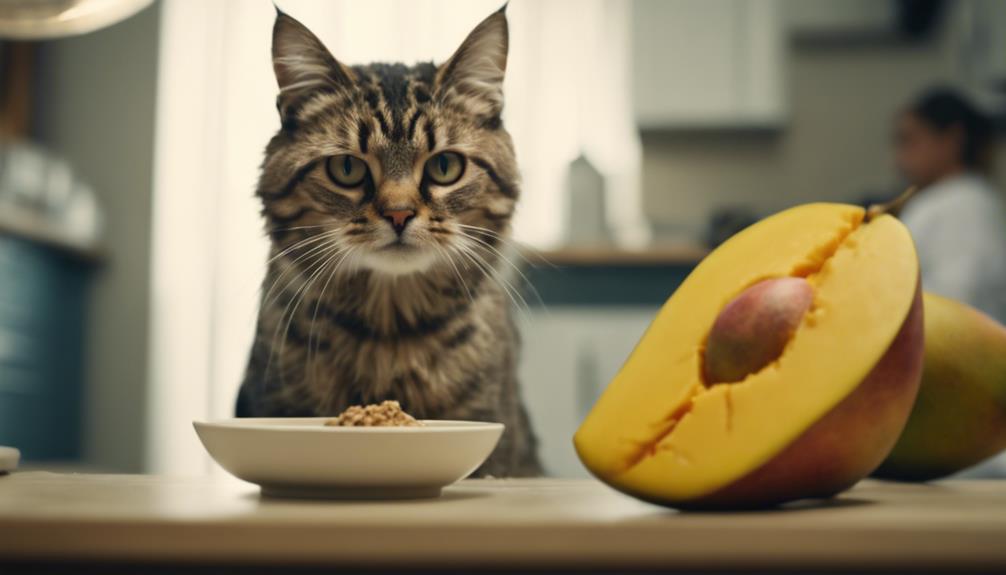
Before incorporating any new foods into your cat's diet, it is advisable to consult a veterinarian to ensure their nutritional needs are met. Your vet can provide personalized guidance based on your cat's health status, dietary requirements, and potential allergies. They can also offer insights into how specific foods, like mango, may impact your cat's well-being.
Conclusion
In conclusion, while mango is not toxic to cats, their limited ability to taste sweetness and produce vitamin C may impact their enjoyment and nutritional benefits from this fruit.
However, with proper preparation and moderation, mango can be safely offered to cats as an occasional treat. It is important to consider their dietary needs and consult a vet before introducing any new foods to ensure their well-being.
Remember, the key lies in balance and careful consideration of their unique nutritional requirements.




